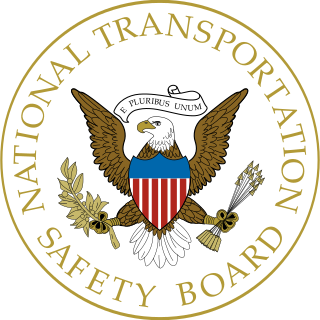Related Research Articles

The Federal Bureau of Investigation (FBI) is the domestic intelligence and security service of the United States and its principal federal law enforcement agency. Operating under the jurisdiction of the United States Department of Justice, the FBI is also a member of the U.S. Intelligence Community and reports to both the Attorney General and the Director of National Intelligence. A leading U.S. counter-terrorism, counterintelligence, and criminal investigative organization, the FBI has jurisdiction over violations of more than 200 categories of federal crimes.

The National Transportation Safety Board (NTSB) is an independent U.S. government investigative agency responsible for civil transportation accident investigation. In this role, the NTSB investigates and reports on aviation accidents and incidents, certain types of highway crashes, ship and marine accidents, pipeline incidents, bridge failures, and railroad accidents. The NTSB is also in charge of investigating cases of hazardous materials releases that occur during transportation. The agency is based in Washington, D.C. It has four regional offices, located in Anchorage, Alaska; Denver, Colorado; Ashburn, Virginia; and Seattle, Washington. The agency also operates a national training center at its Ashburn facility.

A firefighter is a rescuer extensively trained in firefighting, primarily to extinguish hazardous fires that threaten life, property, and the environment as well as to rescue people and in some cases or jurisdictions also animals from dangerous situations. Male firefighters are sometimes referred to as firemen.

Bomb disposal is an explosives engineering profession using the process by which hazardous explosive devices are rendered safe. Bomb disposal is an all-encompassing term to describe the separate, but interrelated functions in the military fields of explosive ordnance disposal (EOD) and improvised explosive device disposal (IEDD), and the public safety roles of public safety bomb disposal (PSBD) and the bomb squad.

The Hostage Rescue Team (HRT) is the elite tactical unit of the Federal Bureau of Investigation (FBI). The HRT was formed to provide a full-time federal law enforcement tactical capability to respond to major terrorist incidents throughout the United States. Today, the HRT performs a number of tactical law enforcement and national security functions in high-risk environments and conditions and has deployed overseas, including with military Joint Special Operations Command units.

The Bureau of Alcohol, Tobacco, Firearms, and Explosives (ATF), also referred to as BATFE, is a domestic law enforcement agency within the United States Department of Justice. Its responsibilities include the investigation and prevention of federal offenses involving the unlawful use, manufacture, and possession of firearms and explosives; acts of arson and bombings; and illegal trafficking and tax evasion of alcohol and tobacco products. The ATF also regulates via licensing the sale, possession, and transportation of firearms, ammunition, and explosives in interstate commerce. Many of the ATF's activities are carried out in conjunction with task forces made up of state and local law enforcement officers, such as Project Safe Neighborhoods. The ATF operates a unique fire research laboratory in Beltsville, Maryland, where full-scale mock-ups of criminal arson can be reconstructed. The agency is led by Marvin Richardson, Acting Director. Richardson previously served as the Associate Deputy Director and Chief Operating Officer, the second highest ranking official at ATF, from October 2019 to June 2021. The ATF has 5,101 employees and an annual budget of $1.274 billion (2019).

A fire marshal or fire commissioner, in the United States and Canada, is often a member of a state, provincial or territorial government, but may be part of a building department or a separate department altogether. Fire marshals' duties vary but usually include fire code enforcement or investigating fires for origin and cause. Fire marshals may be sworn law-enforcement officers and are often experienced firefighters. In larger cities with substantially developed fire departments the local fire departments are sometimes delegated some of the duties of the fire marshal.

The Critical Incident Response Group (CIRG) is a division of the Criminal, Cyber, Response, and Services Branch of the United States Federal Bureau of Investigation. CIRG enables the FBI to rapidly respond to, and effectively manage, special crisis incidents in the United States.
The Behavioral Analysis Unit (BAU) is a department of the Federal Bureau of Investigation's National Center for the Analysis of Violent Crime (NCAVC) that uses behavioral analysts to assist in criminal investigations. The mission of the NCAVC and the BAU is to provide behavioral based investigative and/or operational support by applying case experience, research, and training to complex and time-sensitive crimes, typically involving acts or threats of violence.

The Alaska State Troopers, officially the Division of Alaska State Troopers (AST), is the state police agency of the U.S. state of Alaska. It is a division of the Alaska Department of Public Safety (DPS). The Alaska State Troopers is a full-service law enforcement agency which handles both traffic and criminal law enforcement. The Alaska State Troopers is also involved in apprehending fugitives as part of the Alaska Fugitive Task Force, an inter-agency collaborative of Alaska police departments that cooperates with police agencies throughout the United States and less commonly with Interpol in apprehending wanted men and women. Unlike many lower-48 states, Alaska troopers are both state troopers and game/wildlife enforcement officers.
Domestic terrorism in the United States consists of incidents which are confirmed to be domestic terrorist acts. These attacks are considered domestic because they occurred within the United States and they were carried out by U.S. citizens and/or U.S. permanent residents. As of 2021, the United States government considers white supremacists to be the top domestic terrorism threat.

The Nuclear Emergency Support Team (NEST), formerly known as the Nuclear Emergency Search Team, is a team of scientists, technicians, and engineers operating under the United States Department of Energy's National Nuclear Security Administration (DOE/NNSA). NEST is the umbrella designation that encompasses all DOE/NNSA radiological and nuclear emergency response functions, some of which date back more than 60 years. NEST’s responsibilities include both national security missions—particularly countering weapons of mass destruction (WMD) — and public health and safety, including responses to nuclear reactor accidents. NEST's task is to be "prepared to respond immediately to any type of radiological accident or incident anywhere in the world".
Hazardous Waste Operations and Emergency Response is a set of guidelines produced and maintained by the Occupational Safety and Health Administration which regulates hazardous waste operations and emergency services in the United States and its territories. With these guidelines, the U.S. government regulates hazardous wastes and dangerous goods from inception to disposal.
An incident response team (IRT) or emergency response team (ERT) is a group of people who prepare for and respond to any emergency incident, such as a natural disaster or an interruption of business operations. Incident response teams are common in public service organizations as well as in other organizations, either military or specialty. This team is generally composed of specific members designated before an incident occurs, although under certain circumstances the team may be an ad hoc group of willing volunteers.

The Oklahoma Office of Homeland Security (OKOHS) is an agency of State of Oklahoma that is responsible for reducing the State's vulnerability to acts of terrorism and for minimizing and recovering the damage caused by terrorist attacks. OKOHS is a division of the Oklahoma Department of Public Safety.

FBI Special Weapons and Tactics Teams are specialized part-time tactical teams (SWAT) of the Federal Bureau of Investigation (FBI). The FBI maintains SWAT teams at each of its 56 field offices throughout the country. Each team is composed of a varying number of certified SWAT operators, dependent on office size and funding.

The Deployable Operations Group (DOG) was a United States Coast Guard command that provided properly equipped, trained and organized Deployable Specialized Forces (DSF), which still exist today, to the Coast Guard, United States Department of Homeland Security (DHS), United States Department of Defense (DoD) and inter-agency operational and tactical commanders. Formerly headquartered in Arlington, Virginia, it was established on 20 July 2007, and was commanded by a captain and was decommissioned by the Commandant of the Coast Guard, Admiral Robert Papp on 1 October 2013, although many of the units existed long before the 2007 commissioning. Upon decommissioning, the units previously assigned to the DOG were split between Coast Guard Pacific and Atlantic Area commands.
Kerry Pettingill is a retired American police officer in the state of Oklahoma. Pettingill joined the Oklahoma Highway Patrol and served as its 25th Chief from early 2011 until late 2013 when he retired during the term of Governor of Oklahoma Mary Fallin. Prior to his service as Chief, Pettingill served as the Director of the Oklahoma Office of Homeland Security under Governor Brad Henry from 2004 to 2011.

The Criminal, Cyber, Response, and Services Branch (CCRSB) is a service within the Federal Bureau of Investigation (FBI). Created in 2002 as part of the U.S. government's post-9/11 response, the CCRSB is responsible for investigating financial crime, white-collar crime, violent crime, organized crime, public corruption, violations of individual civil rights, and drug-related crime. In addition, the Branch also oversees all computer-based crime related to counterterrorism, counterintelligence, and criminal threats against the United States.
Active shooter training addresses the threat of an active shooter by providing awareness, preparation, prevention, and response methods.
References
![]() This article incorporates public domain material from websites or documents ofthe Federal Bureau of Investigation .
This article incorporates public domain material from websites or documents ofthe Federal Bureau of Investigation .
- 1 2 3 "Inside the FBI's Hazardous Devices School". FBI.gov. Federal Bureau of Investigation. January 9, 2018. Retrieved March 12, 2018.
- ↑ "Critical Incident Response Group (CIRG)". FBI.gov. Federal Bureau of Investigation. Retrieved March 12, 2018.
- ↑ Wiedeman, Reeves (March 16, 2017). "Inside the FBI's Remote Bomb-Test Training Range". pouplarmechanics.com. Popular Mechanics. Retrieved March 12, 2018.
- ↑ "FBI Takes Lead Role in Training Nation's Public Safety Bomb Technicians". FBI.gov. Federal Bureau of Investigation. September 22, 2016. Retrieved March 12, 2018.
